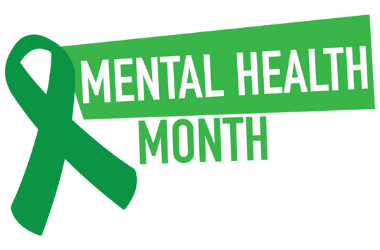Blog
This year, May's Mental Health Awareness Month is spreading the important message that you are not alone. The pandemic has exacerbated feelings of isolation, fear, stress, worry, and loneliness in just about everyone, including the millions of Americans who are living with mental illness.
 The numbers of new cases of mental illness have risen significantly since the pandemic began, including in children and young adults, much of it fueled by isolation and loneliness. These are serious times, and we have had greatly limited access to outlets of stress this past year, such as vacations, gyms, adventure parks, social gatherings, and sports.
The numbers of new cases of mental illness have risen significantly since the pandemic began, including in children and young adults, much of it fueled by isolation and loneliness. These are serious times, and we have had greatly limited access to outlets of stress this past year, such as vacations, gyms, adventure parks, social gatherings, and sports.
Under these conditions, it is perfectly natural for anyone to experience emotional distress. People who never thought they would have a mental health condition have found themselves struggling and being diagnosed.
Unfortunately, the stigma that society has placed on mental illness continues to persist. It's no wonder that people living with mental illness don't feel comfortable mentioning it to anyone. Some who suspect they might be depressed or have anxiety don't even want to tell their family physician. We can change that. We can each do our part to make sure no one feels they are alone.
Pledge to be StigmaFree
It is easy to unconsciously perpetuate the myths and misconceptions associated with mental illness, which can be harmful to people around you. We encourage you to pledge to be StigmaFree by learning more about mental illness and what you can do to help stop the stigma. Here are a few suggestions to start:
- Use respectful language when talking about mental health conditions.
- Challege misconceptions when you see/hear them.
- See the person, not the condition.
- Offer support if you think someone is having trouble.
- Refrain from using harmful labels.
Together, we can change the way society perceives and treats people with mental health conditions through education and understanding. You can find out more about the harmful results of stigma and what to do about it here, on the National Alliance of Mental Illness website.
If you are struggling and feeling alone, we are here for you. Saratoga Hospital's Behavioral and Mental Health Services are broadly available, in one form or another, throughout multiple areas of our hospital and off-sites. Our skilled, confidential providers can also help you recover from wherever you may be on your mental health journey. Here are some of the many options of support available to you:
- Primary Care: Behavioral health services are integrated into all Saratoga Hospital Medical Group primary care practices, provided remotely by the hospital's program partner, Concert Health.
- Addiction Medicine: Since the onset of COVID-19, there has been an uptick in alcohol misuse. Our comprehensive program includes substance abuse and behavioral health counseling. If you are ready to quit, call 518-886-5600 to make an appointment.
- Saratoga Community Health Center: Outpatient behavioral health services, including medication management and counseling, are offered here in an integrated care model.
- Support Groups: Currently, support groups are run virtually or online. You can view the various groups, including mother/baby and cancer support groups, here. Call or email to verify meetings.
- Radiation Oncology Center: Cancer patients are particularly vulnerable during this time. Social workers are easily accessible in all our cancer services to provide patient education, emotional support, and resource referrals for financial assistance, transportation to treatments, and more.
- Emergency Department: Psychiatrists, nurses, and social workers are available to provide mental health crisis evaluations, interventions, and referrals.
- Mental Health Unit: Psychiatrists, social workers, and advanced care professionals are available to visit patients, if needed, throughout the hospital. They also provide short-term inpatient psychiatric care in a safe, therapeutic setting dedicated to helping patients transition home with a stable support network.
Whether you, or someone you know, have a chronic condition or have never experienced symptoms of mental illness before now, delaying care can only exacerbate the condition. Why wait? Help is available. You are not alone. For more information, please visit Behavioral and Mental Health services at SaratogaHospital.org.
If you or someone you know is at immediate risk of self-harm or hurting another person, call 911 or your local emergency number.
And if you or someone you know is considering suicide, please call one of these numbers right away:
- Suicide Prevention Coalition of Saratoga County: 1-800-273-8255
- National Suicide Prevention Hotline: 1-800-273-8225
- Samaritans Suicide Prevention Center Hotline: 1-518-689-4673
- Saratoga County Crisis Hotline: 1-518-584-9030

